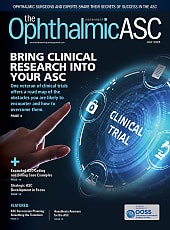Aviceda Therapeutics has completed enrollment for its phase 2b SIGLEC study, assessing the safety and efficacy of intravitreally administered AVD-104 vs avacincaptad pegol (Izervay; Astellas) in patients with geographic atrophy (GA) secondary to age-related macular degeneration (AMD), the company said in a news release. AVD-104, a glycan-coated nanoparticle with a dual mechanism of action, modulates inflammatory pathways and inhibits complement cascade amplification.
SIGLEC is a 2-part clinical trial being conducted in the United States. Initial phase 2a results showed AVD-104 was well tolerated at 3 months, with no drug-related serious adverse events and promising outcomes in reducing GA lesion growth and stabilizing visual acuity. Approximately 300 participants with GA secondary to AMD, best-corrected visual acuity (BCVA) ≥20/320, and GA lesions ranging from 2.5 mm2 to 17.5 mm2 in size have been enrolled. Patients with exudative AMD, choroidal neovascularization, or any ocular condition other than GA were excluded.
Patients will be dosed for 12 months, with an opportunity to remain in the study for an additional 12 months. Participants will receive either high-dose AVD-104 every other month, low-dose AVD-104 monthly, or avacincaptad pegol monthly. The primary endpoint is the difference in growth rate of the GA area at 12 months in patients treated with AVD-104 vs those receiving ACP, as measured by fundus autofluorescence.








